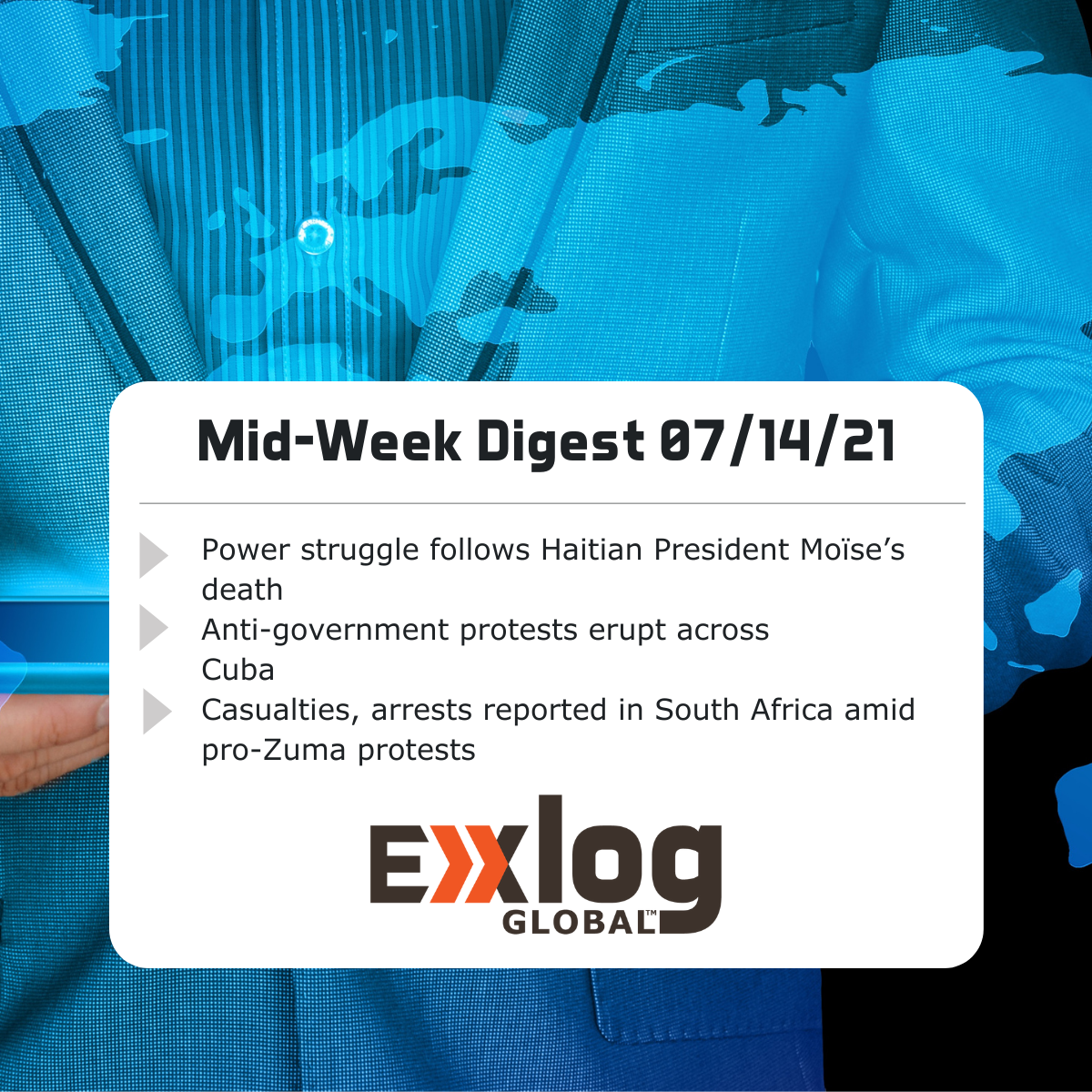Power struggle follows Haitian President Moïse’s death, Anti-government protests erupt across Cuba, Casualties, arrests reported in South Africa amid pro-Zuma protests
Haiti: President Moïse’s death prompts a struggle for power from multiple fronts
Political instability, civil unrest, and increased gang violence in Haiti are likely in the near term amid the ongoing political fallout from President Jovenel Moïse’s assassination on July 7. The political climate in Haiti has continued to deteriorate in the week since the attack, with three politicians now claiming they have the right to lead the country until it holds elections in Sept. 2021. In the immediate aftermath of Moïse’s death, Interim Prime Minister Claude Joseph asserted himself as the acting head of government – this claim has been contested by PM-designate Ariel Henry and Senate Leader Joseph Lambert. Aside from these public challenges to the Interim PM’s leadership, reports suggest that several former politicians and wealthy Haitians are vying for control behind the scenes, potentially aggravating the existing power struggle.
These open and private disagreements in who should assume control of the country have worsened fears of destabilization and the potential for civil conflict. Also contributing to an increased threat of violence are the activities of Jimmy Chérizier—a former police officer and current head of the powerful nine-gang alliance (G9). Chérizier allegedly maintained close ties with the Moïse government and has presided over a surge of gang violence in recent months. He has also stated that his men would take to the streets to protest Moïse’s killing. Any such mass mobilization of gang members, especially in an effort to influence the outcome of the ongoing power struggle, would likely inflame the already volatile security situation in Haiti. Finally, despite a request by Interim PM Joseph that UN and US troops be sent to Haiti to help stabilize the country until elections can occur, there is currently no indication that outside actors are willing or able to significantly improve conditions in Haiti. Though the request for assistance remains under review by both bodies, the US expressed its hesitancy to send aid, citing concerns of “political uncertainty” following a US DoJ and DHS delegation’s visit with the three leaders and the Haitian National Police (HNP).
Cuba: Nationwide anti-government protests demonstrate widespread public anger, economic grievances
A wave of anti-government protests swept across Cuba on July 11, marking the worst outbreak of civil unrest since the Maleconazo uprising in 1994. Demonstrations over economic grievances exacerbated by the COVID-19 pandemic originated in Havana and rapidly spread to over 32 cities nationwide, illustrating widespread discontent with the administration of President Miguel Díaz-Canel. While some protests remained peaceful, several others turned violent, prompting the security forces to deploy tear gas. Media reports indicated protesters threw rocks at the police, triggering the arrest of at least 20 people. Several videos posted on social media showed demonstrators overturning a police vehicle in Cardenas and another depicting protesters looting a store. The recent protests come as Cuba has been experiencing the worst economic crisis in 30 years – the country’s economy shrank by 11 percent in 2020. The COVID-19 pandemic has paralyzed the tourism industry, and government negligence has led to food and medicine shortages and limited access to locally produced vaccines. The government in Havana has blamed US sanctions for its poor economic performance and has accused Cuban Americans of using social media to instigate civil disorder. In an attempt to suppress dissent, the government blocked social media platforms (Facebook, Instagram) and messaging applications (Signal, WhatsApp, and Telegram) on July 12.
South Africa: Casualties, arrests reported as pro-Zuma protests continue
Sporadic pro-Zuma protests that erupted in the province of KwaZulu-Natal on July 9 have reached the Gauteng province and the city of Johannesburg, the country’s economic hub. Riots have left at least 72 people dead, have caused millions of dollars in damage to businesses, and have interrupted an already inefficient COVID-19 vaccination program. South Africa’s largest companies ceased their operations as widespread looting, arson, and gunfire sparked safety and logistics concerns. On July 12, President Cyril Ramaphosa deployed military forces to the Gauteng and KwaZulu-Natal provinces to suppress the intensifying protests. Protracted civil unrest will likely lead to food shortages and harm investor confidence. The rand (ZAR) fell 2.35% against the US dollar (USD) as of the morning of July 14 – the lowest in over two months. Demonstrations began when former President Jacob Zuma surrendered to the authorities – he will serve a 15-month jail sentence for refusing to appear in front of an anti-corruption commission, which was investigating various charges against him. Zuma is accused of corruption and fraud implicating the wealthy and influential Gupta brothers – an Indian-born family with investment interests in South Africa. Zuma’s supporters assert that the charges are politically motivated and have demanded that he be released from custody.


